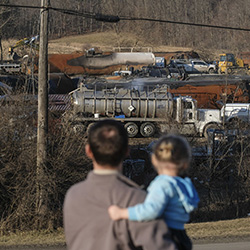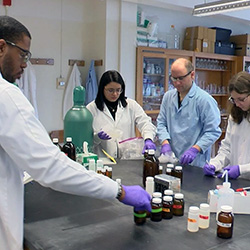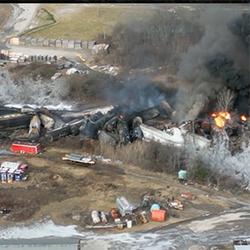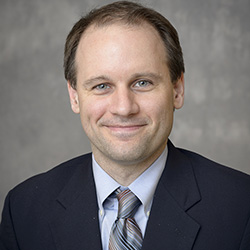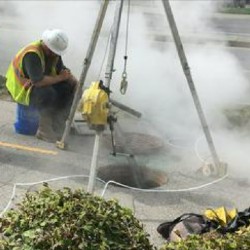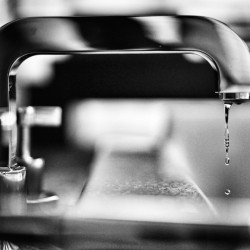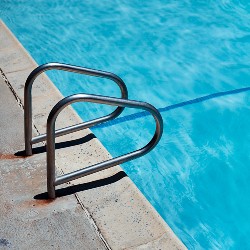Environmental Engineering
With only one world to live in, environmental engineers are helping make sure we handle it with care. The skills of environmental engineers are
becoming increasingly important as we attempt to protect the fragile resources of our planet. Students in Environmental Engineering will have the
opportunity to apply science and engineering principles to improve the environment, water, air and land.
In Civil Engineering you can prepare for a great future with an environmental engineering career that offers a remarkable opportunity to positively affect the quality of life in our communities, our country, and our planet. Check out the Environmental Engineering area and join in on the excitement! You will have opportunities for research and education in a wide range of issues, including remediation of contaminated soils and sediments, industrial and solid waste treatment, water and wastewater treatment, air pollution measurement and control, urban and agricultural air and water quality management, understanding the environmental fate of pollutants, and sustainable engineering. Other options are also available through the
Division of Environmental and Ecological Engineering.
Our Environmental Engineering faculty have leadership roles and participate in numerous national and campus centers and institutes. We offer flexible academic options and research opportunities in our top
environmental facilities for undergraduate students, as well as MS and PhD graduate degree programs. The Purdue Air & Waste Management Association also offers opportunities for student involvement in the advancement of environmental knowledge.
Spotlights
June 16, 2023
In this Bloomberg documentary on the environmental crisis following the train derailment and fire in East Palestine, Ohio, Andrew Whelton, Professor of Civil Engineering and Environmental and Ecological Engineering, shares the experiences of his response team in their effort to assist local residents affected by the disaster.
March 6, 2023
Team Carbonbusters from Purdue University was selected as the Great Lakes Regional Winner in the EnergyTech University Prize. The team was awarded $3,000 for their business plan for their entry, “Removing the Barrier to Entry to Net-Zero Biofuels.”
March 1, 2023
A Purdue CE research team is back in town after a trip to the site of the Norfolk Southern train derailment. The team, led by CE/EEE Professor Andrew Whelton and several students, collected water samples from creeks and homes in East Palestine, Ohio, where a train derailed and spilled hazardous materials like vinyl chloride.
February 15, 2023
Andrew Whelton, Professor of Civil Engineering and Environmental and Ecological Engineering, contributed to a CBS News report about health risks plaguing East Palestine, Ohio after an explosive train derailment earlier this month forced hundreds of evacuations.
January 25, 2023
At the request of two Colorado cities shortly following the Marshall Fire, Purdue University researchers led by Andrew Whelton provided onsite technical assistance and studied the scientific and policy needs specific to drinking water systems' resilience to wildfires. The goal was to better understand the decisions, resources, expertise and response limitations during and after the wildfire.
January 23, 2023
Across the U.S., children and adults are increasingly exposed to harmful chemicals from a source few people are even aware of, Professor Andrew Whelton says.
November 28, 2022
A new book authored by Ernest Blatchley, Lee A. Rieth Professor in Environmental Engineering and Professor in Environmental and Ecological Engineering, provides comprehensive coverage of photochemical reactors and will be used as the text for a class to be taught in the spring.
November 17, 2022
Andrew J. Whelton, professor of civil engineering and environmental and ecological engineering, helps guide communities on how to rapidly find contamination, communicate warnings and inform strategies for returning damaged systems to safe use.
October 12, 2022
Andrew Whelton, Professor of Civil Engineering and Environmental and Ecological Engineering, assists in a study to quantify the impact of the cured-in-place pipe repair method in releasing nanoplastic pollution into the air.
August 12, 2022
In this webinar, Andrew Whelton, Professor of Civil, Environmental, and Ecological Engineering and Director of the Purdue Center for Plumbing Safety, joins a panel of experienced professionals who have helped communities throughout the West and Southwest US inspect, test and help guide the decontamination of water systems affected by wildfire events.
June 21, 2022
Chad Jafvert, Lyles Family Professor of Civil Engineering and Professor of Environmental and Ecological Engineering, has been elected as a Fellow of the Association of Environmental Engineering & Science Professors (AEESP). The honor recognizes members who have exhibited exceptional long-term excellence in environmental research, teaching, or service to the environmental engineering and science community.
May 24, 2022
David Yu, Assistant Professor of Civil Engineering, has received an Early CAREER Development Award of $546,668 from the National Science Foundation to fund research into the enormous complexity associated with how the connections among flood disturbances, flood protection infrastructure designs, decisions of diverse actors, forms of information transmission, and underlying social attributes interweave to shape people's awareness of flood risks and community resilience.
April 11, 2022
Chad Jafvert, Lyles Family Professor of Civil Engineering and Professor of Environmental and Ecological Engineering, has been named the 2022 recipient of the Excellence in Environmental Engineering and Science Education (E4S) Award by the American Academy of Environmental Engineers & Scientists.
March 15, 2022
The more frequent wildfire disasters become, the less time communities will have to recover from each catastrophe. But it can take months for a town's water to be safe to drink again after a wildfire. That's why Andrew Whelton, a Purdue University professor of civil engineering and environmental and ecological engineering, has been regularly showing up to wildfires with his students and dozens of coolers for the past four years.
January 31, 2022
On the morning of December 30, 2021, a grass fire broke out in Boulder County, Colorado on Marshall Road. It quickly began spreading due to 100 mile per hour winds and arid conditions. Just days after the fire’s end, Professor Andrew Whelton boarded a plane to Colorado at the request of community leaders to assess and assist in response and recovery.
July 22, 2021
Grad student Maria Palmegiani was selected as second-place lightning round presenter in the American Water Works Association (AWWA) ACE21 All Virtual poster session - The New Frontier: Beyond the Meter Towards Plumbing Innovation and Water Quality.
May 7, 2021
In an article for The Conversation, Professor Andrew Whelton outlines the impact of wildfires on drinking water distribution networks and building plumbing.
February 1, 2021
Science journalists and book authors will share insights with scientists and engineers about how to communicate risk and relevance from research findings on water safety and health in a webinar moderated by Purdue University professors.
July 21, 2020
Water that has been left sitting in the pipes of K-12 school buildings during the COVID-19 pandemic shutdown could contain unsafe levels of bacteria and metals. As schools begin to reopen across the country, Purdue University engineers are advising them on how to make sure water systems are safe first.
May 18, 2020
Pools across the U.S. are set to reopen in the coming weeks. If recommended chlorine levels are maintained as usual, the pools themselves should pose minimal risk of spreading the coronavirus to swimmers, says a Purdue University engineer who studies pool water decontamination.

